三星“李在镕之笑”背后的局
![]() 04/01 2025
04/01 2025
![]() 394
394
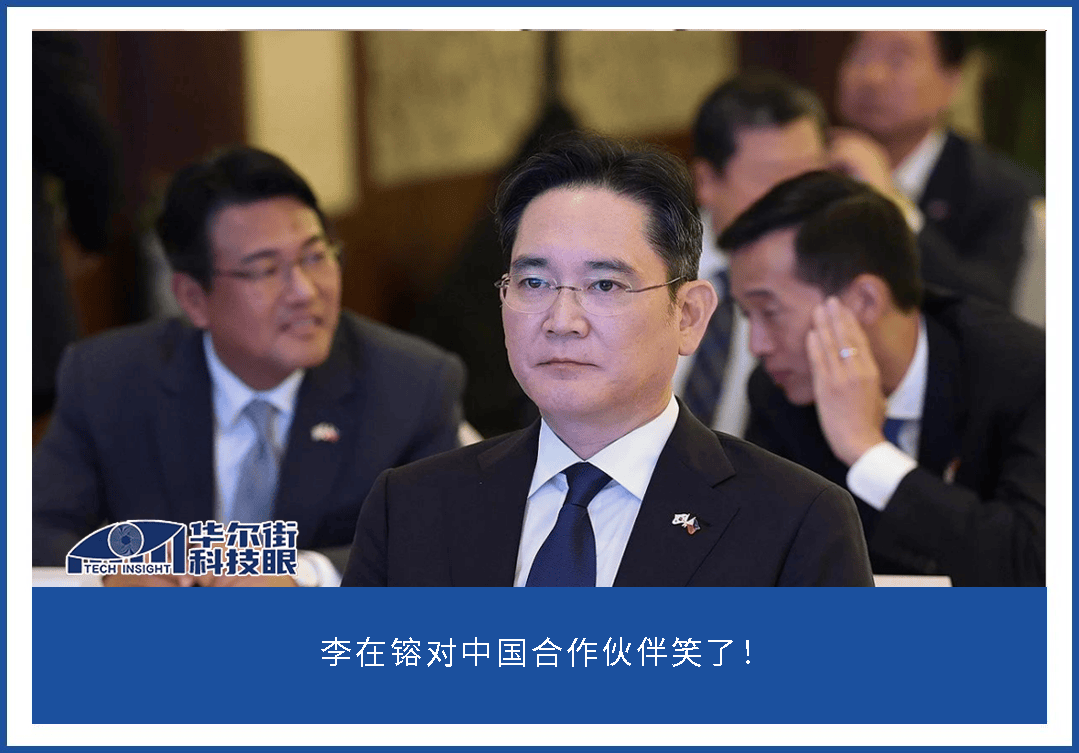
Text/Guo Chuyu
Editor/cc Sun Congying
Not long ago, the 2025 Annual Meeting of the China Development Forum (CDF) concluded. This year's conference focused on the theme of "Fully Unleashing Development Momentum and Jointly Promoting Stable Growth of the Global Economy," attracting attention from all sectors globally. The presence and speeches of numerous heavyweight guests became the focus of public opinion. Among them, the visit to China by Korean Samsung Group Chairman Lee Jae-yong after a two-year hiatus sparked widespread discussion.
Lee Jae-yong has always given the impression of being stern and unsmiling. However, on the day before the forum opened, Lee Jae-yong unexpectedly broke his established image. On March 22, Lee Jae-yong appeared at Xiaomi Automobile factory in Beijing alongside Qualcomm President Cristiano Amon. Xiaomi placed great importance on this meeting, with CEO Lei Jun personally receiving them, and Xiaomi Vice Chairman Lin Bin and other core executives accompanying them throughout. When a photo of the scene was released, a smile on Lee Jae-yong's face instantly became a hot topic of discussion among netizens. Those who know him well understand that this seemingly simple smile is actually quite rare, and many netizens joked about "how the tides have turned" and marveled at the magnitude of changes in the industry landscape.
In past public reports, Lee Jae-yong has often maintained a serious and cautious expression when attending business events, conveying to the outside world the strong aura of Samsung Group in the fiercely competitive market. The smile he showed during the meeting with Lei Jun may imply new considerations by Samsung in business expansion and cooperation layout. As competition in the global technology industry intensifies, Samsung urgently needs to explore new business growth points, and Xiaomi's rapid rise in the field of new energy vehicles undoubtedly provides broad space for cooperation between the two sides.
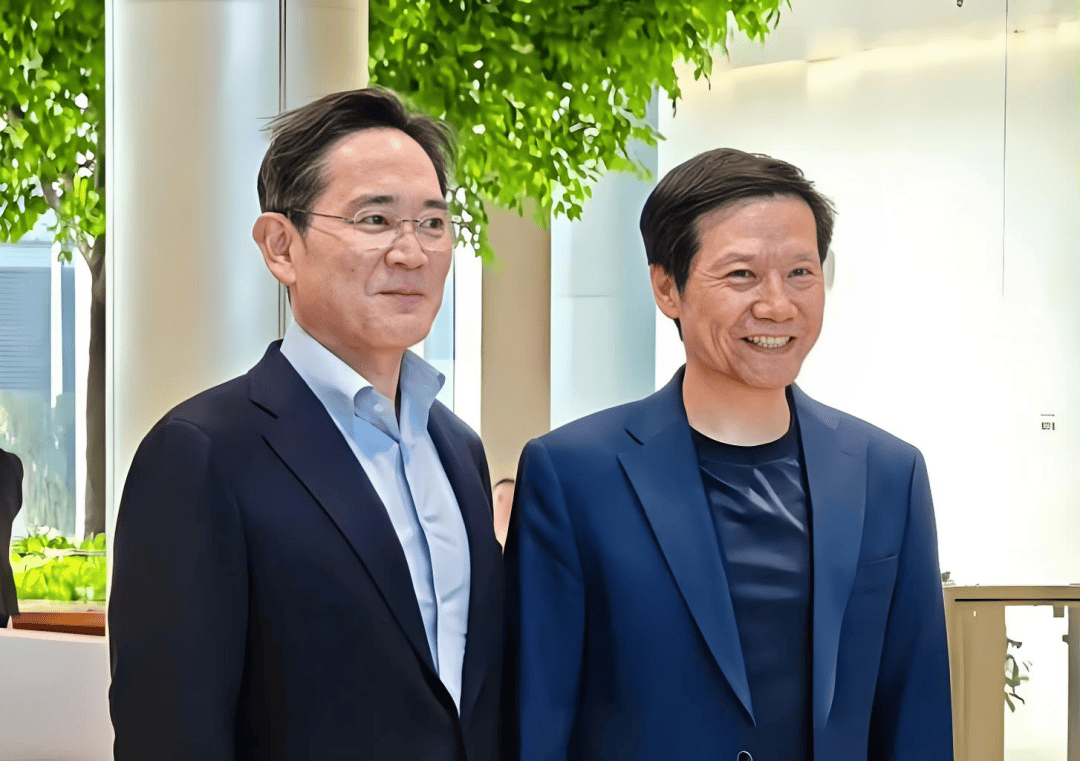
Looking back, Samsung and Xiaomi executives have had heated disputes during business negotiations, with neither side giving in, ultimately leading to a breakdown in negotiations and an unhappy parting. Samsung then took tough measures and stopped supplying screens to Xiaomi. At that time, Xiaomi Phone 5 was facing a severe supply shortage, and Samsung's supply cut was like adding insult to injury, plunging Xiaomi's production and operations into difficulties. To address the pressing issue, Lei Jun had to lower himself and personally visit Shenzhen to apologize to Samsung executives.
Despite these setbacks, over time, based on their respective business considerations, the two sides have once again embarked on close cooperation in smartphones, semiconductors, and other fields, moving forward hand in hand.
However, in recent years, the global semiconductor trade environment has undergone rapid changes, and market competition has become increasingly fierce. The development of Samsung's semiconductor business has gradually slowed, showing signs of fatigue. To address this challenge and find new business growth points, Samsung has begun actively planning a business diversification strategy, striving to create a more robust revenue structure.
In the global new energy vehicle industry landscape, the Korean market has seen its electric vehicle demand temporarily stagnate due to industry saturation, with growth faltering. In contrast, China's new energy industry, fueled by the country's "trade-in" policy, has maintained a steady growth trend. Since the beginning of this year, the year-on-year growth rate of new energy passenger vehicle retail sales has exceeded 20%, with a thriving market. Leading Chinese automakers represented by BYD have accelerated their overseas expansion, with continuous increases in vehicle production and sales.
Against this backdrop, Lee Jae-yong's visit to China was packed with activities. Not only did he visit Xiaomi Automobile factory in Beijing, but he also made a special trip to Shenzhen to visit BYD headquarters. These series of actions send a strong signal that Samsung intends to strengthen strategic cooperation with Chinese enterprises in the field of automotive electronics equipment, hoping to inject new vitality into its business and achieve sustainable development by leveraging the booming trend of China's new energy vehicle industry. Lee Jae-yong's unprecedented friendliness towards his partners may also stem from this.
"Super Gap" Samsung Falls Behind
For a long time, Samsung has occupied a leading position in the industry with its superior technological strength, building insurmountable technological barriers. However, Samsung's proud "Super Gap" is gradually narrowing, and its advantages are no longer significant.
Taking the AI chip high-bandwidth memory (HBM) business as an example, Samsung has fallen behind its Korean counterpart SK Hynix in this field. Last May, media reports revealed that Samsung Electronics' HBM chips failed to pass NVIDIA's tests. Although NVIDIA founder Jen-Hsun Huang later refuted this claim at Computex Taipei 2024, emphasizing that NVIDIA's certification process for HBM memory is extremely rigorous and requires a significant amount of time and patience. However, it is undeniable that HBM memory, as a key technology for enhancing the performance of data centers and AI accelerators, has a decisive impact on a company's competitiveness in the AI chip field. Currently, SK Hynix is NVIDIA's primary HBM memory supplier. As the world's largest memory chip manufacturer, Samsung continues to invest heavily in technology research and development, and its HBM3E products have achieved satisfactory scores in NVIDIA's audits, with quality certification from companies like NVIDIA expected as early as early June. However, inevitably, Samsung has already fallen significantly behind its competitors in this race, missing the best opportunity to seize the market first mover advantage.

Samsung Electronics' 2024 full-year revenue performance presents a complex situation. Its annual revenue reached 300.9 trillion Korean won, with an operating profit of 32.7 trillion Korean won, setting a record second-highest annual revenue, second only to 2022. However, regarding the semiconductor business, Samsung's future outlook is not optimistic. The official announcement shows that in the first quarter of 2025, due to weak demand in the mobile device market, coupled with low capacity utilization and increased fixed cost burdens, profit performance is expected to remain weak. Under these circumstances, Samsung's Foundry Business plans to focus on promoting advanced process development and enhancing process maturity, hoping to thereby expand into the AI and HPC application markets and attract more advanced node customer collaborations.
Meanwhile, due to factors such as reduced capacity utilization and rising R&D expenses for advanced node technologies, the overall profitability of Samsung's Foundry Business has declined. Despite facing many challenges, the business unit is still actively deploying cutting-edge technologies and developing 2nm GAA technology.
In June 2024, renowned analyst Ming-Chi Kuo revealed on the X platform that Qualcomm will become the exclusive SoC supplier for Samsung's Galaxy S25 series. This situation arises because Samsung's in-house developed Exynos 2500 chip, using a 3nm process, has a yield lower than expected, making mass production and shipment unlikely. This not only hits Samsung's revenue in the chip business but also risks weakening its market share and industry influence in the mobile chip field.
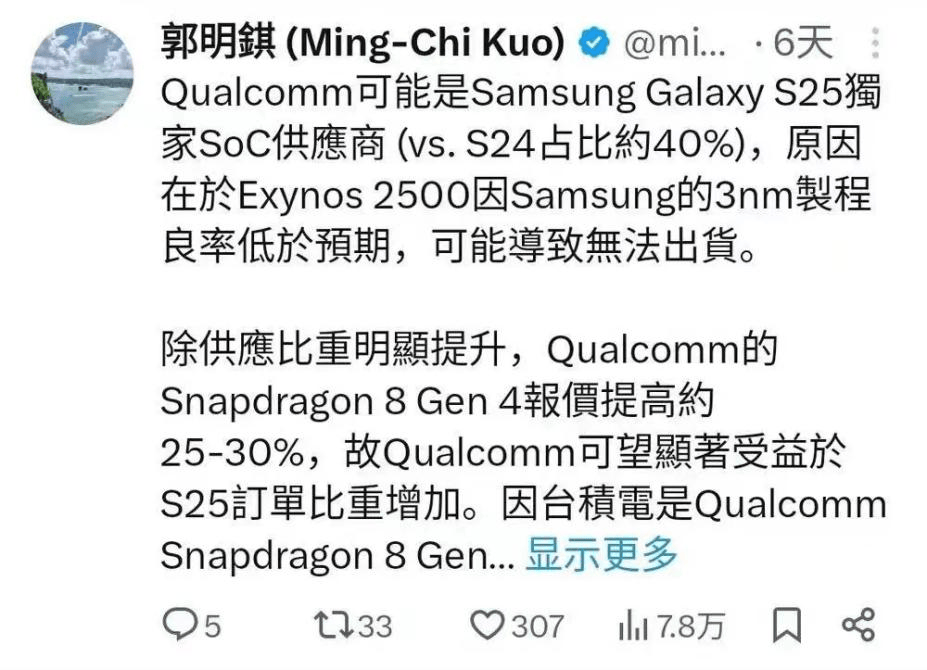
In the fierce competition in the technology industry, Samsung is facing a complex situation. In the semiconductor field, despite Samsung's heavy investment of approximately 842 billion yuan in the 3nm process technology, aiming to seize market high ground with advanced technology, it has struggled to win recognition from major customers due to the chip yield not meeting expectations. This situation has widened the gap between Samsung and industry rival TSMC. Even so, Samsung has not stopped moving forward, focusing on the development of 2nm GAA technology, eagerly desiring a key technological breakthrough to reshape its competitiveness in the semiconductor market.
Although facing challenges in the semiconductor field, Samsung still occupies a leading position in the AI smartphone market. Taking the Samsung Galaxy S25 series launched in 2025 as an example, pre-sales of this series in the Korean market exceeded 1.3 million units, setting a record for the best pre-sales performance in the Galaxy S series' history. Globally, Samsung's smartphone performance is also commendable. Counterpoint data shows that in 2024, Samsung ranked first globally with a 19% market share, with North America and Europe serving as its main market supports. In the US market, from Q1 2023 to Q3 2024, Samsung's smartphone market share surpassed Apple multiple times, demonstrating strong market competitiveness. (For details, see: Samsung S25 China Version Launch, Korean Version AI Kicks Off Localization Campaign in the Chinese Market)
Overall, while facing difficulties in its semiconductor business, Samsung has stabilized its position with its AI smartphone business. In the future, whether Samsung can leverage the advantages of its smartphone business to support semiconductor research and development, break through current technological bottlenecks, rebalance its two core businesses, and achieve coordinated development is worth continuous attention from the industry.
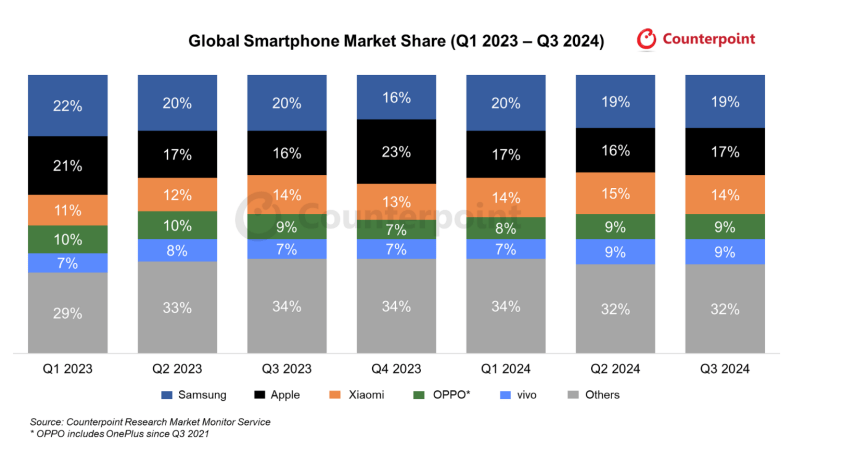
In the first quarter of 2025, Samsung Electronics solemnly announced that the newly launched Galaxy S25 flagship series, with its innovative AI interactive experience and excellent product configuration, will continue to consolidate its leading position in the AI smartphone field.
Does Samsung Want to Revitalize the Chinese Market?
Lee Jae-yong attended the China Development Forum (CDF) again after a two-year hiatus and visited Chinese technology and new energy vehicle enterprises. This series of actions undoubtedly sends a strong signal to the outside world that Samsung is seeking new cooperation.
Although a global giant in the electronics industry, Samsung's overall performance in China's consumer electronics market is not satisfactory. Taking the smartphone market as an example, 2024 data shows that Samsung's market share in China is only 1%. However, Samsung has a broad business layout and a rich variety of products, ranging from smart electronic devices and accessories to smart appliances, storage devices, displays, and IoT products.
But at the same time, entering 2024, Samsung has significantly accelerated its pace of cooperation with the Chinese market. Samsung Electronics' annual report shows that in 2024, Samsung's exports to China soared to 64.9 trillion Korean won (approximately 326 billion yuan), a year-on-year increase of 53.9%, surpassing exports to the United States. Although Samsung's smartphone market share in China is low, it still occupies an important position in core components such as semiconductors and display panels, becoming an indispensable partner for many Chinese electronics enterprises.
On March 20, Samsung made an appearance at the 2025 China Appliance & Electronics World Expo (AWE 2025), comprehensively showcasing its product line of home appliances and electronic devices. At the exhibition site, Samsung's cutting-edge products such as the AI God series of home appliances, Vision AI solutions, transparent display products, and the new SmartThings home intelligence interconnection ecosystem were unveiled. The entire exhibition centered on the concept of "AI of All," fully demonstrating Samsung's innovative strength in hardware integration and AI technology applications. It also indicates that Samsung hopes to further delve into the Chinese market and enhance its brand influence through technological innovation.
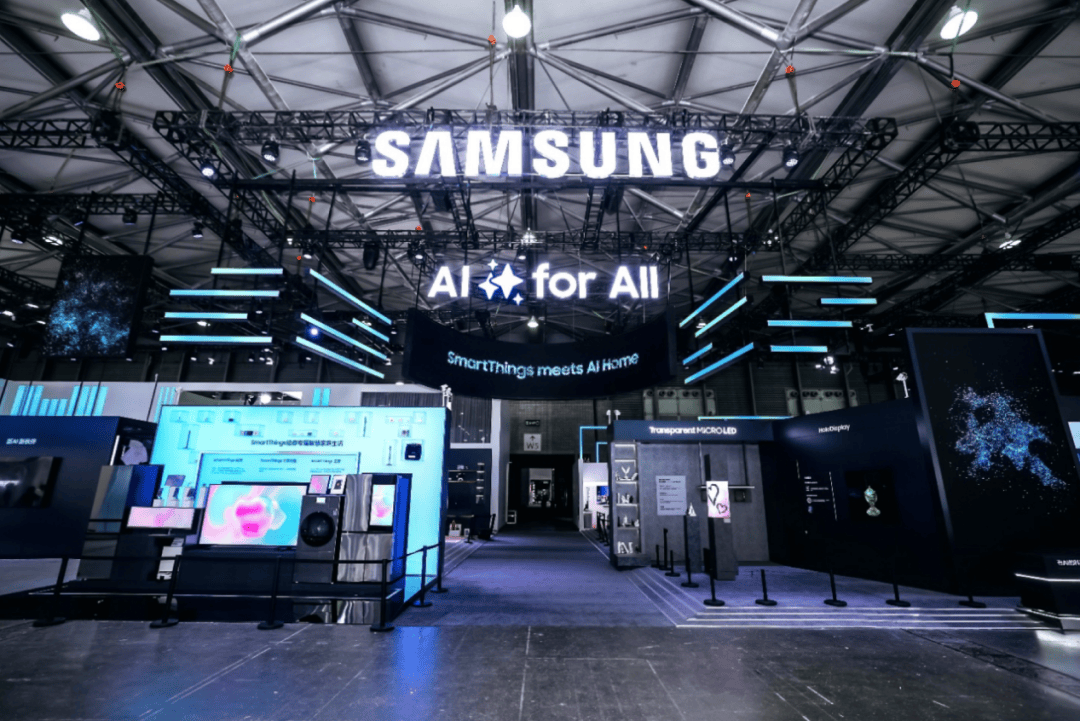
In the global TV business landscape, Samsung Electronics continues its glory. In 2024, despite fierce market competition, Samsung once again topped the global TV sales rankings, accounting for 28.3% of global TV market sales. Although this figure slightly declined from 2023, Samsung still sits firmly at the top of the industry due to its profound technological accumulation and brand influence. Especially in the high-end home appliance field, Samsung's advantages are evident. In the fourth quarter of 2024, in the premium TV market with prices above $2,500, Samsung Electronics' shipments accounted for 50.5%, nearly half of the global premium TV market, fully demonstrating its dominance in the high-end market.
At the 2025 China Appliance & Electronics World Expo (AWE 2025), Samsung's appearance was eye-catching. This exhibition showcased Samsung's excellent ability to deeply integrate AI technology into its products, which is highly consistent with Samsung's development philosophy of "first is technology, second is technology, third is still technology." Looking back, the Samsung Note 7 explosion incident, coupled with periodic tensions in Sino-Korean relations and other factors, hindered Samsung's business development in China's C-end market, significantly impacting its brand image and market share.
However, as Sino-Korean relations gradually ease and bilateral economic and cultural exchanges become increasingly frequent, the market environment is ushering in new opportunities. At present, it is undoubtedly an excellent opportunity for Samsung to focus on China's C-end market, reshape its brand image, and expand its market share. With its rich experience in technology research and development, product innovation, and high-end market operations, Samsung is expected to achieve new breakthroughs in the Chinese consumer market and continue to write a new chapter in brand development.
Lee Jae-yong: "Samsung is at a Critical Juncture."
As a business giant, the Samsung Group's economic strength rivals that of a small country. Lee Jae-yong was born with a "golden spoon" and enjoys abundant resources and unparalleled glory. However, despite his family's halo, he has not slackened in comfort. In the fiercely competitive business arena, Lee Jae-yong remains highly vigilant at all times, integrating a strong sense of crisis into every aspect of corporate operations, constantly contemplating Samsung's future direction.
According to South Korean media reports, starting from late February, Samsung launched a special seminar for senior executives of all its subsidiaries, with the theme of "Value Education for Restoring Samsung's Reputation." This seminar was conducted in a unique video format. Although Lee Jae-yong did not directly appear in the video, he conveyed a serious warning through it—Samsung is "at a critical juncture." He demanded that executives must have a firm determination of "either survival or death" and go all out to address the current crisis, demonstrating their courage and responsibility to burn their boats.
It is noteworthy that the video also incorporated the business philosophies of the late founding chairman Lee Byung-chull and the late former chairman Lee Kun-hee. As the founder of Samsung, Lee Byung-chull laid a solid foundation for Samsung's development with his outstanding business wisdom. Lee Kun-hee, through a series of bold reform measures, propelled Samsung's transformation from a traditional manufacturing industry to a high-tech industry, creating Samsung's business legend. Incorporating the business philosophies of the predecessors into this seminar aims to awaken the sense of mission and responsibility of executives, inspiring them to draw on the wisdom of their predecessors and lead Samsung out of the predicament with firmer beliefs and innovative thinking. This seminar is not only a retrospective of Samsung's past glory but also a profound reflection on future development, indicating that Samsung will meet market challenges with a brand-new attitude.
Lee Jae-yong attributes Samsung's current existential crisis to a decline in structural competitiveness. In recent years, Samsung Group's dominance in multiple core business areas has gradually weakened, with market shares for products such as televisions, smartphones, and DRAM memory chips showing varying degrees of decline in 2024 compared to 2022, undoubtedly sounding the alarm for Samsung's development.
In fact, maintaining a sense of crisis at all times has long been the core of Samsung's corporate culture, a tradition stemming from the "New Management" initiative launched by Samsung in 1993. That year, former Samsung Chairman Lee Kun-hee witnessed Samsung electronics being placed in a corner of an appliance store in Los Angeles, ignored by customers, and a strong sense of crisis immediately overwhelmed him. Although Samsung had achieved certain successes in the Korean market at that time, Lee Kun-hee knew that if changes were not made in a timely manner, Samsung would struggle to gain a foothold in the global market.
To drive comprehensive change, in 1993, Lee Kun-hee led a large number of Samsung executives to Los Angeles, Tokyo, Frankfurt, London, Osaka, and other international cities to convene a series of large-scale marathon meetings. These meetings lasted an average of over 8 hours per day, sometimes even up to 16 hours. During this period, the famous Samsung "Frankfurt Declaration" emerged. After months of in-depth reflection and reform, Samsung resolutely embarked on a new business path centered on quality. Through this reform, a sense of crisis within Samsung was fully established, and advance planning and layout gradually became the norm in corporate management.
Since then, Samsung has continued to increase its investment in technological research and development and product quality improvement. With forward-looking strategic transformation and business restructuring, Samsung successfully withstood the impact of the 2008 global financial crisis and gradually grew into a top-tier global technology enterprise.
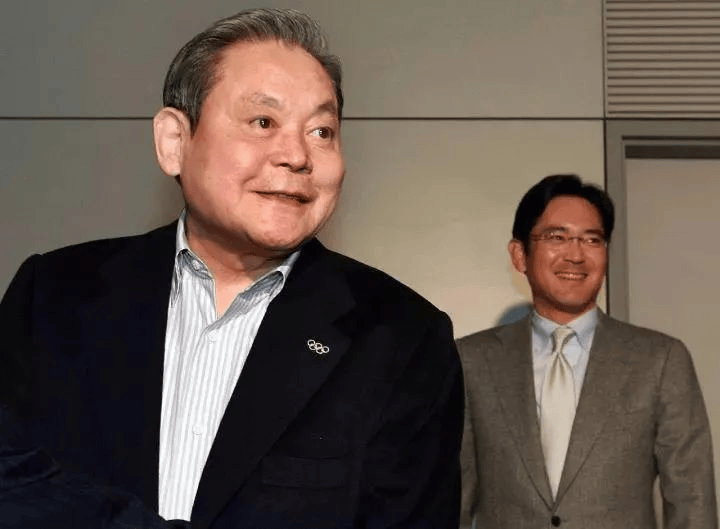
Photo: Lee Kun-hee (left) and Lee Jae-yong (right)
As the cornerstone of Samsung Group's corporate culture, the "Frankfurt Declaration" has always guided the strategic development direction of the group. Through ideological innovation, Lee Kun-hee greatly enhanced the cohesion of the organization. This management philosophy that emphasizes the spiritual development of employees has been well continued in the operating system of the current Chairman, Lee Jae-yong. Today, facing new challenges, Lee Jae-yong is attempting to leverage this profound cultural heritage to once again stimulate Samsung's internal vitality, lead Samsung out of its predicament, and continue to write new glories.








